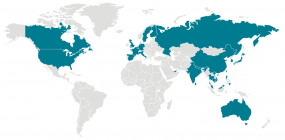CDC | Situation Summary
CDC is closely monitoring an outbreak of respiratory illness caused
by a novel (new) coronavirus (termed “2019-nCoV”) that was first
detected in Wuhan City, Hubei Province, China and which continues to
expand. Chinese health officials have reported more than a thousand
infections with 2019-nCoV in China, including outside of Hubei Province.
Infections with 2019-nCoV also are being reported in a growing number
of international locations, including the United States, where 5 cases in travelers from Wuhan have been confirmed in four states (AZ, CA, IL, WA) as of January 26, 2020.
Source and Spread of the Virus
Chinese health authorities were the first to post the full genome of the 2019-nCoV in GenBankexternal icon, the NIH genetic sequence database, and in the Global Initiative on Sharing All Influenza Data (GISAIDexternal icon)
portal, an action which has facilitated detection of this virus. On
January 24, 2020, CDC posted in GenBank the full genome of the 2019-nCoV
virus detected in the first U.S. patient from Washington state. The
virus genetic sequence from the patient in Washington is nearly
identical to the sequences posted from China. The available sequences
suggest a likely single, recent emergence from a virus related to bat
coronaviruses and the SARS coronavirus. The available sequence
information does not provide any information about severity of
associated illness or transmissibility of the virus.
Early on, many of the patients in the outbreak in Wuhan, China
reportedly had some link to a large seafood and animal market,
suggesting animal-to-person spread. However, a growing number of
patients reportedly have not had exposure to animal markets, and there
is evidence that person-to-person spread is occurring. At this time,
it’s unclear how easily or sustainably this virus is spreading between
people. Learn what is known about the spread of newly emerged coronaviruses.
Illness Severity
Both MERS and SARS have been known to cause severe illness in people.
The complete clinical picture with regard to 2019-nCoV is still not
fully clear. Reported illnesses have ranged from infected people with
little to no symptoms to people being severely ill and dying. Learn more
about the symptoms associated with 2019-nCoV.
There are ongoing investigations to learn more. This is a rapidly
evolving situation and information will be updated as it becomes
available.
On This Page
Confirmed 2019-nCoV Cases Globally
Risk Assessment
Outbreaks of novel virus infections among people are always of public
health concern. The risk from these outbreaks depends on
characteristics of the virus, including whether and how well it spreads
between people, the severity of resulting illness, and the medical or
other measures available to control the impact of the virus (for
example, vaccine or treatment medications).
Investigations are ongoing to learn more, but person-to-person spread
of 2019-nCoV is occurring. Chinese officials report that sustained
person-to-person spread in the community is occurring in China.
Person-to-person spread in the United States has not yet been detected,
but it’s likely to occur to some extent. It’s important to note that
person-to-person spread can happen on a continuum. Some viruses are
highly contagious (like measles), while other viruses are less so. It’s
important to know this in order to better assess the risk posed by this
virus. While CDC considers this is a very serious public health threat,
based on current information, the immediate health risk from 2019-nCoV
to the general American public is considered low at this time.
Nevertheless, CDC is taking proactive preparedness precautions.
What to Expect
More cases are likely to be identified in the coming days, including
more cases in the United States. Given what has occurred previously with
MERS and SARS, it’s likely that person-to-person spread will continue
to occur. It would not be surprising if person-to-person spread in the
United States were to occur. Cases in healthcare settings, like
hospitals, may also occur.



0 comments:
Post a Comment